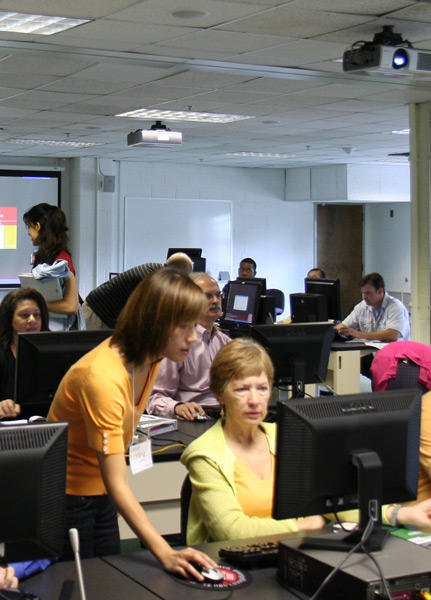DELTA’s 10th Summer Institute Teaches Beyond the Tools

May 30, 2008
Divided into two cohorts, Summer Institute participants attended four half-day sessions with peers with common objectives and experience—or inexperience—with technology. Through the cohort, the participants found camaraderie among a small community of people interested in blended or online education. During the week they were inspired by each other’s plans, ideas, and experiences with incorporating technology into teaching.
Richard Shryock, College of Engineering academic advisor and instructor, signed up for Summer Institute to learn some best practices for using technology in his class, Engineering 101: Introduction to Engineering and Problem Solving. He made strides in the right direction, and after a week of workshops, seminars, and conversations with others in his cohort, he realized that the concepts presented at Summer Institute had a broader application.
“The big light bulb that went off was that I could potentially affect more than just the course I’m involved in, and I hadn’t been thinking any bigger than that,” said Shryock. As a member of the College of Engineering Office of Academic Affairs, Shryock wants to pursue ways to increase the use of learning technologies across departments within his college.
The Summer Institute, which was held in NC State’s D.H. Hill Library, focused on more than how to use tools such as Dreamweaver and Elluminate. With a goal of helping faculty improve a student’s learning experience, DELTA staff emphasized the principles of effective instruction when using technology. The week of workshops and seminars mirrored the ADDIE model of instructional design, with classes on analysis, design, development, implementation, and evaluation.
“We danced a tango of theory and practice,” said Stacy Smith, Associate Director of DELTA’s Faculty Development and Support Services. “We presented a concept, then followed-up with hands-on practice.” Smith explained that faculty members came to Summer Institute looking for theories of effective instruction, but they were also ready to build, create, and learn tangible skills.
Over several days participants developed a fictional online course, Music 260: History of Jazz. They assessed their audience; created a Blackboard Vista course space; developed an online lesson; created graphics; edited video; and discussed group work, course delivery, and assessment.
“It helped to alleviate many fears about technology being too hard,” said one participant. “I learned so much—it was fantastic.”
The learning didn’t stop for lunch. Lunch sessions featured a speaker, panel, or meeting with a DELTA staff member. Through these sessions participants were introduced to campus resources and inspired by faculty success stories. Speakers included faculty members Scott Fitzpatrick, winner of the 2008 Gertrude Cox Award for Innovative Excellence in Teaching and Learning with Technology, and Kay Sandberg, a professor of chemistry who is an exemplar faculty member in teaching via distance education. These speakers left participants excited about the possibilities of blended and online education.
“I was totally blown away by [Kay Sandberg’s] presentation,” said Miriam Ferzli, Biological Sciences teaching assistant professor. “She is doing real teaching online. If I can just emulate a little piece of that I’ll be happy.”
On the final day of Summer Institute, DELTA offered open exploration—available to the entire campus—through twelve elective courses, ranging from an overview of Web 2.0 applications to a primer on analyzing copyright issues. Thirty-five additional participants from across campus attended. This year electives focused on large course redesign (LCR). Two guest speakers, who had implemented LCR strategies at their universities, shared their success stories. Norbert Pienta, Associate Professor and General Chemistry Coordinator at the University of Iowa, presented on the planning, implementation, and outcomes of the General Chemistry course redesign at Iowa. Steve Brewer, Assistant Professor and Director of the Biology Computer Resource Center at the University of Massachusetts – Amherst, gave participants a sense of what it is like to be in one of his redesigned biology classes.
“I was very pleased to hear that Steve Brewer’s findings are very much concurrent with our own observations here,” Ferzli said. Ferzli teaches over 200 students in Biology 181: Introductory Biology I and is exploring ways to enhance a blended learning experience. “Being at the Institute was great because I got a lot of insight about how you can build a community of learners online,” Ferzli said.
In addition to teaching participants skills and best practices, Summer Institute introduced participants to the resources and support staff available to them on campus. Throughout the week they met more than a dozen members of DELTA Instructional Support Services, as well as staff from NC State Libraries and the Office of Information Technology, who can provide services for their courses.
“Participants benefit from a real awareness of the tremendous support structure at NC State,” Smith said. “It’s eye-opening that there is a responsive, expert group of people who are there, excited, and willing to help.”
DELTA’s first Summer Institute was held in 1999 and included 15 faculty members and their support staff. Since its inception, over 400 faculty members have attended Summer Institute.
“The Institute from the beginning has been grounded in the belief that while technology can push us to think of new pedagogy, good pedagogy must guide the use of technology,” said Donna Petherbridge, DELTA’s Associate Vice Provost for Instructional Support Services. A testament to the program’s effectiveness, over five years 100 percent of respondents to a post-program evaluation said they would recommend the Summer Institute to colleagues interested in learning more about teaching and learning with technology.
In March 2008 the DELTA Instructional Support Services Faculty Support Team won the Gertrude Cox Award for Innovative Excellence in Teaching and Learning with Technology for their work on the Summer Institute. Eight faculty members who have attended Summer Institute have also received this award.
“Receiving the Gertrude Cox Project award this year acknowledged the impact that the Summer Institute has had at NC State,” Petherbridge said.
- Categories:


